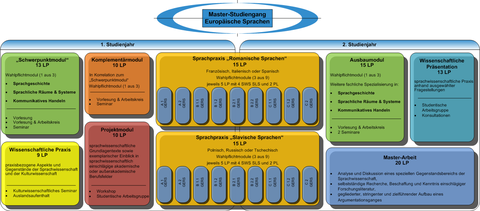Master's Program in European Languages: Syllabus
Table of contents
1. Overview of the syllabus
The standard duration of the Master’s Program in “European Languages” is four semesters. The Program is organized in a modular way and concludes with the Master’s thesis. Successful completion of the program involves earning 120 ECTS credit points.
2. Modules: Explanatory notes
Year One:
- Concentration module (Schwerpunktmodul)
In this module, classes can be selected from one of the following three concentrations:
- Historical Linguistics: Analysis of internal and external language history, e.g. based on historical periods of one language and/or in comparison with cognate languages; based on branches of Linguistics (such as phonology or syntax), etc.
- Linguistic areas and systems: Analysis of the construction of linguistic areas, analysis of individual language systems or cognate languages, etc.
- Communicative behavior: Theory and practice of speech acts, e.g. from the view of general pragmalinguistics, the research of corporate communication, etc.
Classes within these concentrations have to be selected such that at least two languages are covered.
Exam requirements:
- A combined research paper (180h)
- An ungraded report (90h)
- Complementary Module
In this module, students select classes - either from one or from both of the complementary modules – that will supplement their knowledge and competencies beyond the scope of the concentration module. At least two languages need to be covered.
Exam requirements:
- Talk or reading-based assignment (90h)
- Ungraded report (90h)
- Project Module
This module both comprises basic texts about the history and theory of linguistics and provides a cursory look at linguistically pertinent academic or non-academic job sectors.
Exam requirements:
- Academic talk (120h)
- Ungraded profession-oriented editing assignment (120h)
- Academic Practice
This module comprises aspects and topics in Linguistics and Cultural Studies. The teaching and learning formats involved here are a seminar in Cultural Studies as well as a stay abroad with a duration of no fewer than 4 weeks. Thus, in addition to boosting students’ subject-specific knowledge in Cultural Studies and methodology, this module also fosters students’ intercultural and foreign-language competences.
Exam requirements:
- Reading-based assignment (90h)
- Ungraded academic talk (90h)
Year Two:
- Extension Module (Ausbaumodul)
This module’s classes are in turn compiled by students from one of the three concentrations:
- Historical Linguistics
- Linguistic Areas & Systems
- Communicative behavior
At least two languages have to be covered. The concentration from Year One can either be continued, or another concentration can be selected here.
Exam requirements:
- Combined term paper (180h)
- Ungraded prospectus (60h)
- Ungraded report (90h)
- Academic Talk (wissenschaftliche Präsentation)
This module primarily serves as preparatory advice with a view to the Master’s thesis. In the first stage, students discuss the projects of their Master’s theses amongst peers. Then they present the prospectus of their MA theses to a committee and defend the draft of their thesis in front of this committee in a 45-minute defense colloquium.
Exam requirements:
- Ungraded thesis outline (60 h)
- Ungraded thesis prospectus (150h)
- Colloquium (120h)
- Master’s Thesis
On the basis of the results from the Module “Academic Talk” (Wissenschaftliche Präsentation), students prepare their Master’s thesis in the 2nd half of their second year of study. The length of time designated for this is 17 weeks. The primary thesis advisor of the Master’s thesis is a EuroS professor. The Master’s thesis is to be drafted in German; however, based on the thesis advisor’s consent or based on an official request submitted to the exam committee, it can also be drafted in English or any other language taught in the Master’s Program.

Modulübersicht
